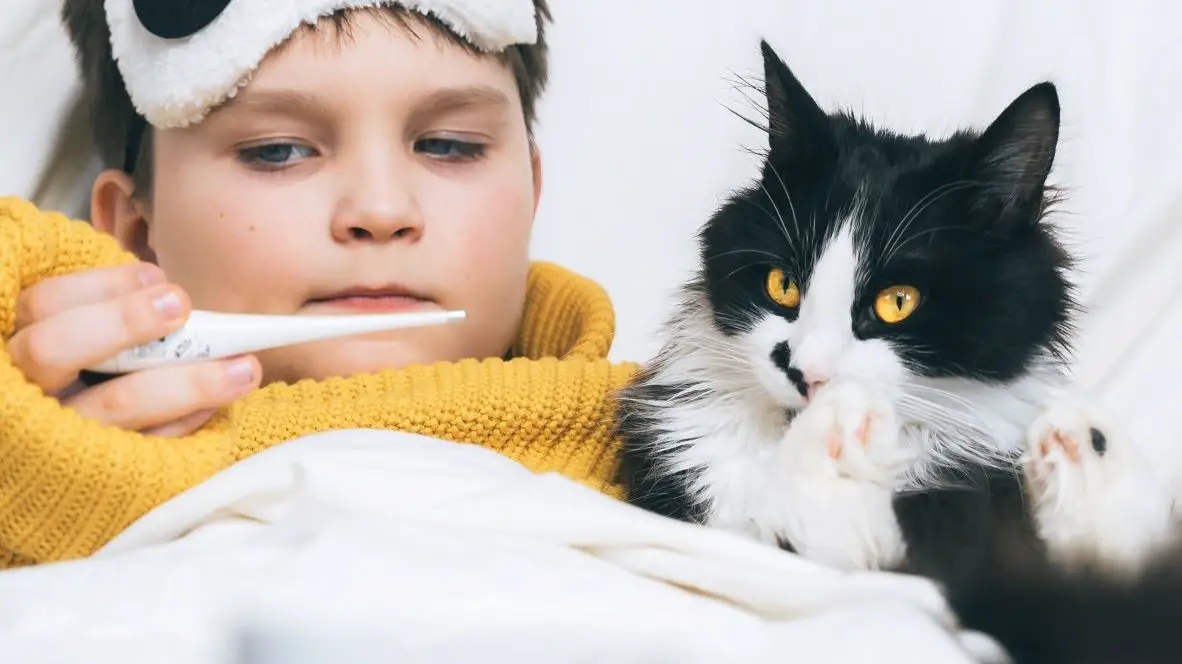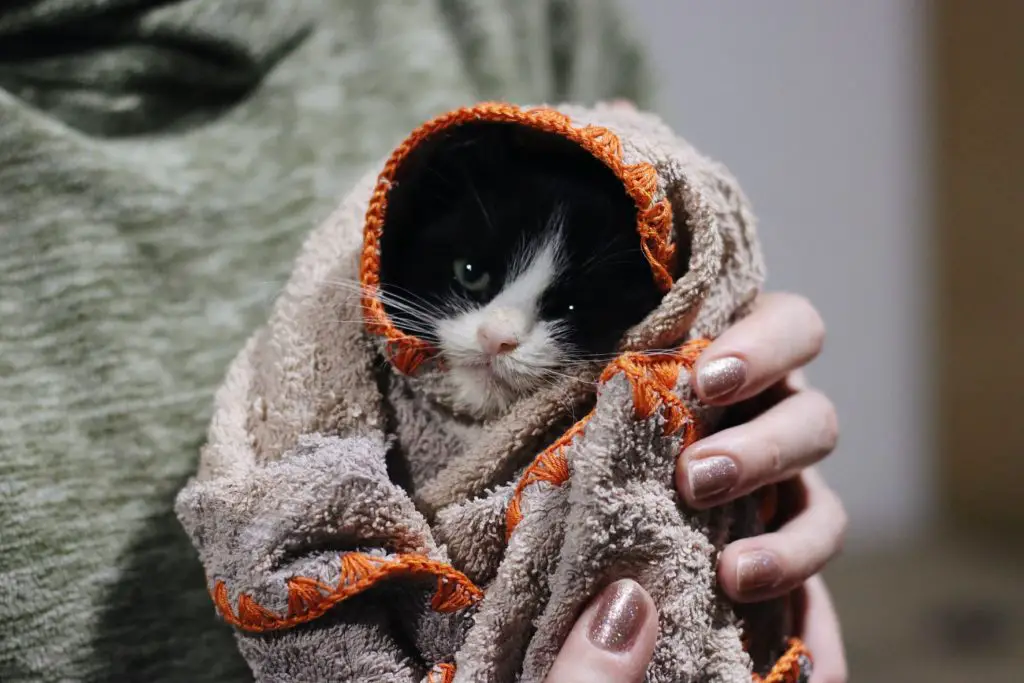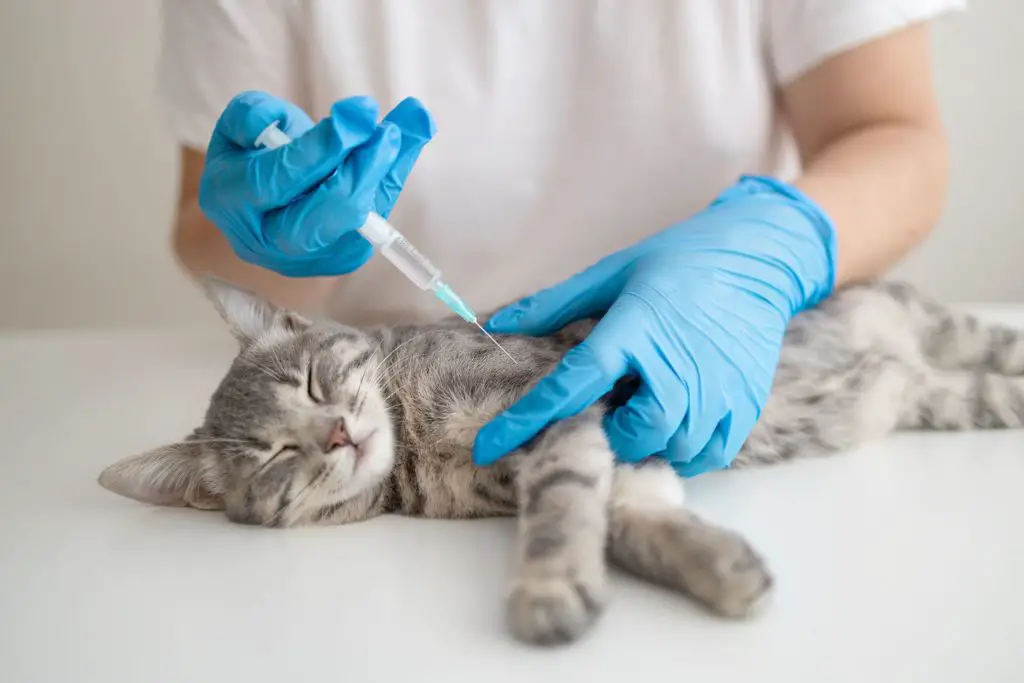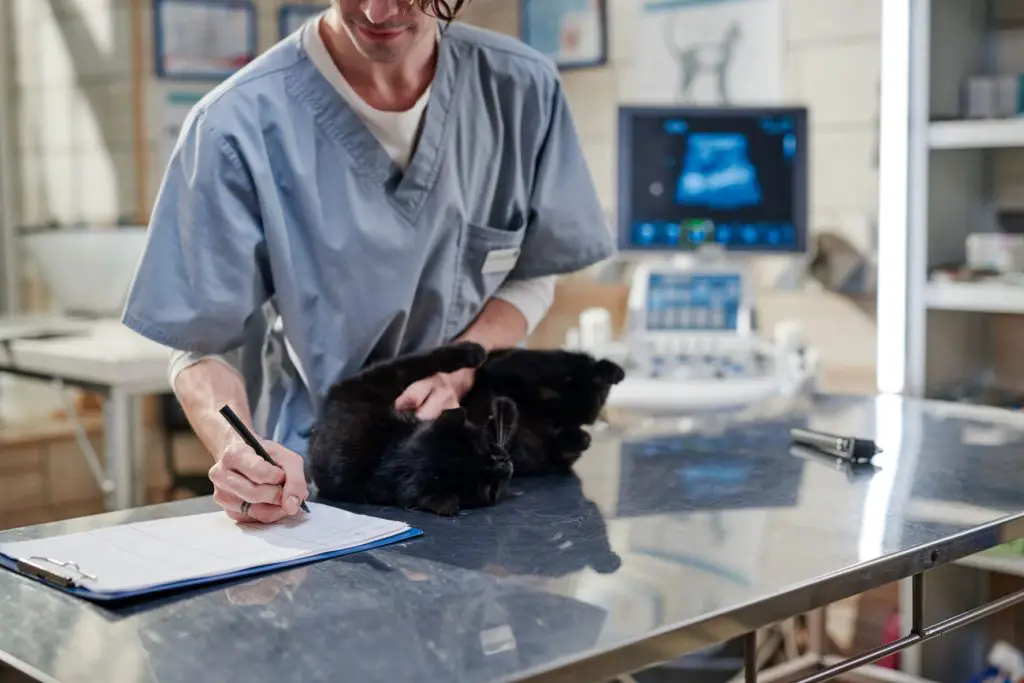Can you catch a cold from your cat or kitten? While there are some diseases you could acquire from your feline pet, the common cold or flu isn’t one of them. So if you’re worried that you might get sick because your cat sneezed on you, you can rest assured that contracting a disease from your cat is very low. Still, individuals with immature or weakened immune systems are more susceptible to feline diseases.

Our social media feeds are testimonials of how much we love our cats. We let them into our apartments, our hearts, and yes, even in our beds. Given how much we love to cuddle with our furry felines, it can sometimes make us wonder: ‘can my kitty make me sick?‘
Cats are fastidiously clean animals, and they love taking care of their hygienes. But the saliva that they use to clean their fur could contain microbes. So the question is, is it possible for our beloved cats to make us sick?
In this guide, I cover the following topics:
- Can you catch a cold or the “cat flu” from your cat or kitten?
- What are different feline upper respiratory infections?
- Similarities and differences in symptoms between cats’ colds and human colds.
Can You Catch a Cold From Your Cat? (The Long Answer)
No, you cannot catch a cold from your cat or kitten in most cases. Here are some reasons why:
- In most cases, cold viruses are species-specific. A majority of the common cold and flu viruses are limited in effect to a particular species of animal. This means that, if there’s a virus that makes a cat sick, it can only affect other cats. Therefore, if you or your family member has a cold, your cat won’t catch it. Similarly, if your cat has been sneezing due to a cold virus, then you and your family members are quite safe.
- Although there are some dieases that can be passed from animals to humans, for the most part, feline cold and flu viruses are not zoonotic. This means that humans and animals cannot transmit it to each other. Therefore, if your otherwise healthy indoor cat sneezes on you, simply follow basic hygiene guidelines like washing your hands and face.
Just like humans, cats do catch colds, and, just like in humans, the main culprits behind the transmission of colds in cats are viruses and bacteria. These microbes get transmitted through the air in the form of droplets or saliva of a sneezing cat.
Cold Symptoms: Cat VS. Humans
In short, humans and cats display similar symptoms when they have a cold. According to the West Chester Veterinary Center, cats with colds can display the following symptoms:
| Cold Symptoms | Cats | Humans |
|---|---|---|
| Sneezing | ✓ | ✓ |
| Cough | ✓ | ✓ |
| Runny Nose | ✓ | ✓ |
| Teary/Runny Eyes | ✓ | ✓ |
| Loss of Appetite | ✓ | ✓ |
| Fever | ✓ | ✓ |
| Lethargy | ✓ | ✓ |
| Dehydration | ✓ | ✓ |
| Nasal Congestion/Stuffy Nose/Snoring | ✓ | ✓ |
| Sore Throat | N/A | ✓ |
| Bodyache/Headache | N/A | ✓ |
Home Treatments: What To Do When Your Cat Is Sick
For most common colds, the best way is to make your cats comfortable so that they’re able to fight off whatever is causing their symptoms. Monitor your cats, and if symptoms aren’t getting better and there are no signs of improvement within 3-4 days, then a trip to the vet needs to be planned.

If your cat is sick, here’s what you can do at home:
- In a multi-cat household, isolate the sick cat in a separate room to prevent the spread. The other cats should not have any direct contact with the infected cat. Have all the necessities such as a litter box and easy access to food and water bowls.
- Keeping an extra blanket around to keep them warm and comfortable will help with the healing process.
- If your cats have constant teary or runny eyes, then cleanse them with a saline solution ( 1 cup of boiled or distilled water & 1/4 a teaspoon of salt) with a clean cloth.
- Keep a humidifier running so that the increased humidity helps soothe dry noses, eyes, and congestions caused when your cat is sick.
When Are Cats Most Susceptible to Colds?
- Typically, outdoor cats are most susceptible to colds since they can frequently come in contact with other sick stray or feral cats.
- If you have recently boarded your indoor cat at a pet hostel, then it could have caught a cold from another cat at the kennel.
- Additionally, indoor cats that have access to open windows or balconies, it’s also possible for viruses, and bacteria can also get blown in through the screens.
- Sick cats that are already battling a disease are also quite suceptible to viruses and bacteria because of the weak immune system. Additionally, these cats are also at a higher risk of getting secondary bacterial infections because of their compromised immune system. Therefore, careful monitoring is required for these cats.
- Similar to humans, as cats get older and become senior cats, their body and immune response aren’t as active. Therefore, older cats will need to have more care when exposing them to other cats and the outside world.
What Are Common Feline Colds?
Two types of cat colds that account for over 90% of feline respiratory infections are:
- Feline herpesvirus (FHV-1)
- Feline calicivirus (FCV).
Thankfully, there are vaccinations to prevent both these viral infections. If you are up-to-date with your pet’s vaccines, you don’t have to worry about your cat acquiring these infections.

However, if your cats aren’t up to date with their vaccines, then monitor them for a couple of days to see if their immune system can get rid of the virus or whatever’s affecting them by itself. If any prolonged coughing or sneezing lasts more than 3-4 days, then it’s time to go to the vet to get your feline friend checked out for more serious issues. If there’s any difficulty breathing, it could indicate a more severe infection. Thus, it’s time to head to the emergency vet!
Causes, Symptoms and Treatment of FHV-1 or Feline Herpesvirus
Unvaccinated cats, cats with stress or underlying health issues, and those who come in contact with infected cats’ droplets are more likely to develop FHV-1. Feline herpesvirus is not contagious to humans.
The symptoms of FHV-1 in cats include:
- Nasal congestion
- Sneezing
- Eye discharge
- Conjunctivitis
- Excess blinking and squinting
According to the experts at VCAHospitals, cats with FHV-1 will need oral antivirals and antiviral ophthalmic/eye drops.
Causes, Symptoms, and Treatment of Feline Calicivirus
Feline calicivirus is also more common in multi-cat environments like shelters. Almost 25 to 40% of cats are carriers of this virus in animal rescue shelters. This virus poses no threat to humans.
According to Vet Cornell, feline calicivirus can cause the following symptoms in cats:
- Sneezing
- Nasal congestion
- Drooling
- Eye discharge
- Pneumonia
If left untreated, FCV is known to be fatal in almost 60% of cats. Treatment for this infection includes IV fluids, antibiotics, and supportive care.
What Diseases Can Be Passed On to Humans? (Zoonotic Diseases)
Again, zoonotic diseases are diseases or illnesses that can be passed from animals to humans. While these cases are very rare, there are a few zoonotic diseases to be aware of that can cause cold-like symptoms:

- Mycoplasma. This is a bacterial infection that cats usually get when their immune systems are weak. According to experts, Mycoplasma can also cause feline upper respiratory infection and symptoms in cats. In addition to nasal discharge and sneezing, infected cats tend to show anemia, lethargy, pale gums, eye discharge, fever, excess weight loss, and fatigue.
Humans could get mycoplasma from cats. The treatment for mycoplasma includes a round of antibiotics taken over several days. - Bordetella, Kennel cough or B. Bronchiseptica. In cats, B. Bronchiseptica/kennel cough causes symptoms similar to cold and flu such as sneezing, nasal and eye discharge, cough, and fever. It is usually seen in cats living in large groups in shelters. There is a vaccine available to prevent it. Treatment includes antibiotics and supportive care.
Humans could get kennel cough from cats but such transmission is rare and most people with good immunity are not at a risk. - Feline Chlamydiosis. Another zoonotic virus that causes sneezing in cats is chlamydia psittaci. In humans, chlamydiosis causes burning eyes and irritation.
If a cat with this organism sneezes, it could pass it on to its immuno compromised humans. Worry not – it is a curable infection although one might need a round of antibiotics.
Conclusion: Can You Catch a Cold From Your Cat or Kitten?
The answer to the question ‘Can You Catch a Cold From Your Cat or Kitten?’ is that most healthy humans will not catch colds or flu from their cats, especially if their cat is otherwise healthy and vaccinated. If your cat has recently been in a pet boarding facility or you’ve recently adopted it from the shelter, do make sure to rule out the above diseases that cause symptoms similar to cold and flu.
Viruses that cause colds and flu in humans and cats are totally different. So if your cat has sneezed on you, simply wash your hands and face, and you should be fine.

I recently started fostering a young abandoned cat with thoughts of re-homing her but she’s far more feral than I first realized. I believe she’ll still be successful except it’ll take quite a bit longer. When the time comes, will she do good even though she’ll be getting uprooted or is it in her best interest to stay here permanently?
Depends how young she is! If she’s with you and making good progress with socialization, then she’ll be alright even if she’s uprooted. If they’re socialized young then she’ll be equipped to adjust and deal with most things afterwards even if it might be a little uncomfortable for the first couple of days.